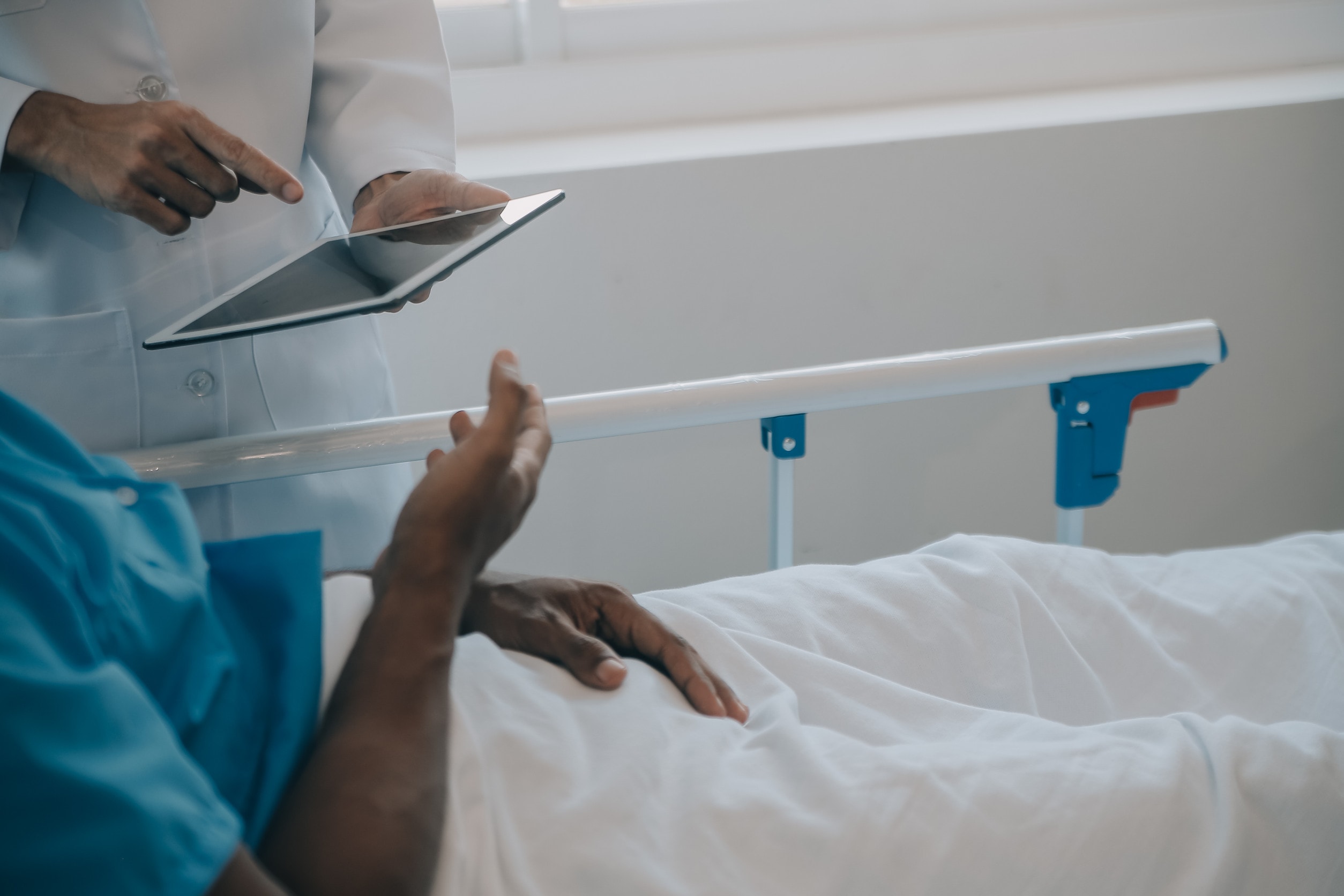When you agree to have an operation, you expect the highest standard of care from the surgeons, nurses, and other professionals involved. The treatment you receive is supposed to help you on your road to recovery, not hinder it– so what happens when surgical negligence gets in the way?
According to statistics published by NHS Resolution, a total of 13,784 clinical claims were made against the NHS in 23/24, and 1,982 of these were related to surgical specialities. In this guide, we’ll tell you everything you need to know about making a surgical error, from what is classed as negligence in the operating room to funding a solicitor.
Keep reading if you’d like to learn more. Or, get in touch with our team of friendly advisors today to find out if you could be eligible to claim by:
- Calling us on 0330 123 0546
- Contacting us online

Jump To A Section
- What Is Surgical Negligence?
- Types Of Negligent Surgery Errors
- Who Can Make Surgical Negligence Claims?
- Can I Claim If My Procedure Was Carried Out By The NHS?
- Am I Able To Claim On Behalf Of A Loved One?
- The Average Surgery Negligence Compensation
- How Can Surgery Error Compensation Help Me?
- What Do I Need To Claim For Surgical Negligence?
- How Medical Negligence Claims Care Can Help
- Learn More
What Is Surgical Negligence?
Surgical negligence is a kind of medical error that falls under the umbrella of medical negligence. This can range from errors in administering anaesthesia and misdiagnosing sepsis, all the way up to a surgeon amputating the wrong limb.
All medical professionals, including surgeons, need to provide care that meets a minimum standard. This is known as their duty of care. For example, surgeons can get guidance on the standards they should meet from the Royal College of Surgeons (RCS), whereas a pharmacist might get advice from the General Pharmaceutical Council (GPC). While the steps they need to take might be different, they still need to reach that same standard of care.
Keep reading to learn more about what surgical errors can look like, or contact our team today to discuss your particular circumstances.
Types Of Negligent Surgery Errors
Some common examples of negligent surgical errors can include:
Incorrect Body Part Or Procedure
Wrong-site surgery, or surgery on the wrong part of the body, can happen in a number of ways. For example, if you have bone cancer, you may need to have part of your leg amputated to stop it from spreading. If your surgeon amputated the wrong leg by mistake, this could have a significant impact on all aspects of your life. Having the wrong limb amputated is referred to as a Never Event, meaning that the incident should have never happened in the first place had the correct medical procedures been adhered to.
Delays To Procedure
Not all delays in surgery are caused by negligence, but some are. For example, if a nurse or surgeon lost your details or paperwork, your procedure could be delayed. If the delay causes your condition to get worse, then you could potentially make a claim.
Anaesthesia Errors
Anaesthesia is one of the most important parts of most surgeries, but if you are given too much or too little, it can cause a lot of harm. For example, being overdosed on general anaesthesia can cause brain damage, and too little could cause you to wake up during surgery, resulting in significant pain and psychological effects.
Damage To Other Parts Of The Body
If your surgeon lacks the skills necessary to perform your surgery, this could cause further damage to your health. For example, their lack of skill during a spinal surgery could cause nerve damage, which in turn can cause paralysis and a lack of sensation. Any surgeon must have the necessary training and experience to complete the type of surgery they are performing.
Informed Consent
Before undergoing non-emergency surgery, your surgeon needs your informed consent. This means they need to explain what the surgery is, what the risks are, and how it will happen. If your surgeon operated on you or performed a supplemental or even unnecessary surgery without first obtaining your informed consent, this could be an example of medical negligence.
These are only a few examples of surgical errors, and if you can’t see your exact circumstances, that doesn’t mean that you can’t claim. Talk to our team of helpful advisors today to learn more, or keep reading to find out who can make surgical negligence claims.
Who Can Make Surgical Negligence Claims?
Anyone can make a surgical negligence claim as long as they can prove that medical negligence has occurred. But what does this term actually mean?
Essentially, for medical negligence to occur, three criteria need to be met. These are:
- A medical professional needs to owe you a duty of care
- They must breach this duty of care
- You need to suffer avoidable harm as a direct result of this breach
In all of the examples above, we’ve talked about how you could be harmed as a result of your surgeon failing to provide care that meets the minimum standard, and therefore, breaching their duty of care.
If you are still wondering whether or not you could make a claim after being harmed by the negligent actions of a surgeon, contact our team today.

Can I Claim If My Procedure Was Carried Out By The NHS?
Yes, you can claim if you suffered negligence during a procedure that the NHS carried out. The same standards apply to all medical professionals, whether they work in an NHS facility or as part of the private sector. If they fail to meet this standard, and you’re harmed as a result, then you have a right to claim compensation.
Our team are here to help. If you’ve been harmed as a result of surgical negligence, talk to one of our advisors today.
Am I Able To Claim On Behalf Of A Loved One?
You can make a claim on behalf of a loved one for surgical negligence if they can’t do it for themselves. While everyone has the right to claim compensation, not everyone can make their own claim.
To claim for someone else, you can act as their litigation friend. This means that it’s your responsibility to do things like communicate with their solicitor and make choices in their best interest.
You can apply to act as a litigation friend for:
- Someone under the age of 18, or;
- Someone who doesn’t have the needed mental capacity to make their own claim
When you make a claim for yourself, you have to start it within 3 years, as per the Limitation Act 1980. However, when you act as a litigation friend in either of the above cases, the time limit doesn’t apply. You just need to start before:
- The claimant turns 18, or;
- The required mental capacity is regained.
If you’d like to learn more about claiming as a litigation friend, contact our team of advisors today.
The Average Surgery Negligence Compensation
The average surgical negligence compensation amount isn’t actually relevant, because medical negligence claims are so specific. The amount that you can get depends on a range of factors, from the severity of the harm you suffered to how much evidence you have.
So, instead of talking about average amounts that have no bearing on your specific claim, let’s look a bit closer at what your potential payout could contain.
Every successful medical negligence claim results in general damages. Compensation that falls under this heading covers the physical and mental harm you’ve suffered, and it also covers loss of amenity. This essentially means it covers the impact on your quality of life.
You might also be eligible for special damages. This could combine with general damages to form your payout, and it covers the financial losses caused by the harm you suffered. For example, if a surgeon amputated the wrong leg, this would have far-reaching financial consequences. Special damages could help you cover the cost of things like:
- Home adjustments
- Mobility aids
- Prosthetics
- Travel
- Private healthcare
- Prescriptions
- Childcare
- Lost earnings, both past and future
How Is Compensation Calculated?
Many different factors are taken into account when your compensation is calculated. This includes the severity of the harm you’ve suffered, as well as how much evidence you have, and how it has affected your daily life.
One helpful tool that professionals use when calculating general damages for medical negligence compensation is the Judicial College Guidelines (JCG). This document is used because it provides guideline compensation brackets for a number of physical and mental injuries.
You can take a look at some of these guidelines below, but please note that these are not guaranteed amounts, and the first line in this table has not been taken from the JCG.
| Injury | Compensation Bracket | Notes |
|---|---|---|
| Multiple severe instances of harm alongside substantial financial losses, like lost wages | Up to £1,000,000+ | This figurative payout represents a combination of multiple instances of severe harm, alongside special damages, which cover the financial losses your injuries cause. |
| Very Severe Brain Damage | £344,150 to £493,000 | While there may be some ability to respond to basic commands, the claimant will have little to no language function or meaningful response to the surrounding environment. |
| Moderate Brain Damage (i) | £183,190 to £267,340 | In this bracket, the claimant will suffer a personality change, a moderate to severe intellectual deficit, and no prospect of employment. |
| Paraplegia | £267,340 to £346,890 | This bracket will depend on factors such as the degree of independence possessed by the claimant, their age and life expectancy, and the presence of depression. |
| Severe PTSD | £73,050 to £122,850 | The severe effects of PTSD will prevent the claimant from working or living as they had before the trauma occurred. |
| Female Reproductive Injuries (g) | In the region of £12,450 | Failed sterilisation that leads to an unwanted pregnancy, but without any serious psychological effects or depression. |
| Loss of One Arm (i) | Not Less Than £167,380 | Total loss of one arm, amputated at the shoulder. |
| Above-Knee Amputation of One Leg | £127,930 to £167,760 | Compensation awarded in this bracket will depend on factors such as the level of amputation, the presence of phantom pains, and the success of prosthetics. |
| Scarring With No Internal Injuries | In the region of £10,550 | Scars caused by an exploratory laparotomy that found no significant internal injuries. |
When you make a claim for special damages, you need to provide evidence of the financial losses you have suffered, such as receipts and payslips. These documents could be used to calculate how much compensation you could be awarded under special damages.
To learn more about surgery negligence compensation or to find out if you could be eligible for a payout, talk to a member of our team today.
How Can Surgery Error Compensation Help Me?
Surgery error compensation can help you in a number of ways. For example, while medical negligence payouts can’t undo the harm you’ve suffered, making a successful claim can help restore a sense of justice. It can also help in making sure that the same mistakes don’t happen again, keeping future patients safe.
But the most obvious benefit of making a claim is that it can help you restore some financial stability. Errors in surgery can result in immediate financial burdens, from the cost of private surgeries and treatments to full-time nursing care. Receiving a payout can help give you some peace of mind, knowing that these costs are covered.
Interim Payments
Interim payments are essentially an advance on your compensation, which you can apply for to cover important and immediate costs, such as medical expenses. You can only claim an interim payment if your case has a high chance of succeeding.
Contact our team today to find out if you could be eligible for an interim payment, or keep reading to learn more about the surgical error claims process.

What Do I Need To Claim For Surgical Negligence?
To make a surgical negligence claim, you’ll need evidence. This is one of the most important parts of the entire medical negligence claims process, because the success of your case depends on whether or not you can prove that negligence occurred. But how can you go about doing this?
We always recommend working with a solicitor on your case, and our panel could help you collect evidence like:
- Photographs of visible harm, like an amputation or scar
- Tests and scan results that show harm was done
- A symptoms diary that shows how your condition has worsened
- Witness statements from anyone who saw the surgery, or witnessed the effects
- Your medical records that state what surgery you were scheduled to have and the outcome of this
In some cases, a medical negligence claim can be put to the Bolam test. This is where a panel of experts in the field, like neurosurgery or general surgery, examine the actions of your doctor or surgeon. They then form a report on whether or not they deem their actions negligent.
We are here to help. If you’d like to learn more about how an expert solicitor from our panel could help you prove your claim, contact us today. Or, read on to learn more about working with an expert medical negligence solicitor.
How Medical Negligence Claims Care Can Help
So, how can we help? At Medical Negligence Claims Care, we believe that high-quality legal representation should be available to everyone, no matter what their financial status is. To help us uphold this value, our panel of specialist solicitors work on a No Win No Fee basis by offering their clients a Conditional Fee Agreement.
This means that they can use their decades of experience to help you through the surgical negligence claims process, without taking:
- Upfront fees
- Ongoing fees
- Any payment for their work at all if the claim fails
If it succeeds, then they’ll take a success fee. This is a small percentage of your compensation, but the percentage they’re allowed to take is limited by law, making sure you get the majority of what you receive.
Why Work With A Solicitor?
You might be wondering why you should work with a solicitor. Well, our panel already have decades of experience, and they’ve helped various clients all over the country receive compensation.
They’ve done this by providing top-tier legal services, like:
- Help with collecting evidence
- Communicating with the courts and the defendant
- Arranging independent medical assessments
- Decoding and translating legal jargon
- Co-ordinating with rehabilitation specialists to aid your recovery
Contact Our Panel
Our team of advisors are here to help. Get in touch with us today to start your free consultation and find out whether an expert solicitor from our panel could take on your claim. Get started by:
- Calling us on 0330 123 0546
- Contacting us online

Learn More
To learn more about making a medical negligence claim:
- Find out if you could claim for a medication error in a hospital
- Learn how to claim for the misdiagnosis of ovarian cancer
- Get help with claiming for a prescription error
Or, to find more resources:
- Information on having surgery from the NHS
- Complain about a healthcare service provider to the Care Quality Commission (CQC)
- NHS information on recovering from an operation
Thank you for reading our guide on surgical negligence claims.

